Part 3: Organisational health and capability
To ensure that we can achieve our outcomes, impacts, and outputs, we need a strong foundation of skilled people working together in a well-run organisation.
The organisation
The work of the Auditor-General is carried out by about 350 staff in two business units – the Office of the Auditor-General (OAG) and Audit New Zealand, supported by a shared team of corporate services staff – and by auditors contracted from about 50 private sector accounting firms.
The OAG carries out strategic planning, sets policy and standards, appoints auditors and oversees their performance, carries out performance audits, provides reports and advice to Parliament, and carries out inquiries and other special studies.
Audit New Zealand is the larger of the two business units. It carries out annual audits allocated by the Auditor-General, and operates from seven locations around the country. It also provides other assurance services to public entities within the Auditor-General's mandate and in keeping with the Auditor-General's auditing standard on the independence of auditors.
Figure 19
Our operating model
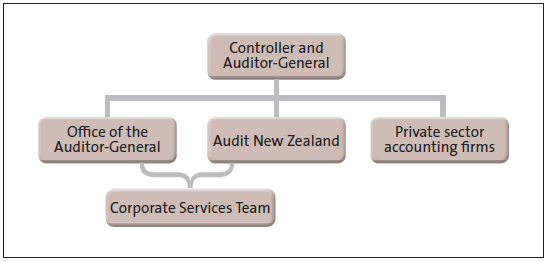
The core expertise of the Auditor-General is in auditing and public governance and management. Underlying this expertise are our technical skills (for example, in accounting and auditing) and the exercise of our professional judgement. We are able to apply this by:
- listening to, and knowing about, the public entities we audit, our stakeholders, and the public sector so that we understand their expectations and the context for our work, and know the effect of our work; and
- building our individual and collective expertise, experience, and judgement so that we can strengthen our contribution to improving public sector performance.
Our people
We will continue to recruit a number of new staff each year. Some of these will be experienced professionals – replacing those who have left us – but we also hire a number of accounting graduates. When evaluating candidates, we are careful to select people who have not only the required expertise but also a strong affinity with the core ethical and public service values of the Office. Through their work for the Office, we expect to see our staff develop both their vocational and leadership expertise, strengthening their contribution to the Office and the public sector, and being sought by other public sector organisations for their knowledge of, and contribution to, improving public sector performance.
We will continue our focus on each individual's needs in developing skills identified in our competency frameworks, on our leadership development programmes, and on improving the level of engagement of our people (as measured by our annual staff survey).
A particular area of development focus from 2010 to 2013 is our auditors' understanding of, and expertise in, the changed audit requirements in the Auditor-General's revised auditing standard about reporting the performance of public entities. It is critical not only that entities are assessed appropriately according to the standard but also that these assessments are consistent throughout the public sector.
Historically, our highest area of staff attrition is in recently qualified accountants. The global and local economic downturn resulted in a reduced turnover of staff in 2009/10. However, as expected, attrition in 2010/11 has been returning to pre-recession levels.
The Office benefits from a diverse workforce, and we are committed to recognising and valuing different skills, talents, experiences, and perspectives among our employees. A diverse workforce will help the Office relate to our clients and bring a variety of perspectives to bear on our work.
Figure 20
Organisational health and capability – main impact measures and standards
| 2010–13 main impact measures and standards |
Actual |
|---|---|
| Staff engagement | |
| Improve (or at least maintain) the engagement and satisfaction of our staff measured against the previous two years. The actual result for 2011 was: Overall engagement: 3.78 Overall satisfaction: 3.81 Base needs met: 3.93 Individual contribution: 3.70 Teamwork: 3.72 Growth: 4.04 |
Gallup survey's staff engagement scores in 2008, 2009, 2010, and 2011. 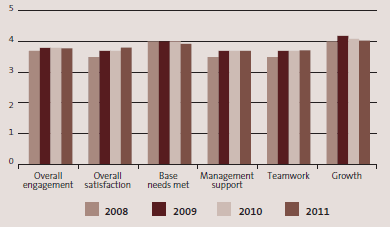 |
| Staff experience and expertise | |
| Improve (or at least maintain) the average years of experience of our staff measured against the previous two years. The actual result for 2011 was: OAG 7.82 Audit NZ 5.08 CST 3.74 |
Average number of years staff have been employed by the Office for the five years from 2007 to 2011 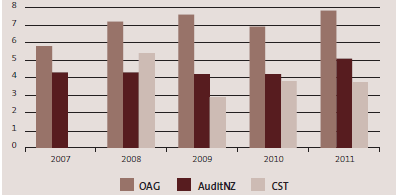 * Corporate Services function is shared between the OAG and Audit New Zealand business units. From 2008, the staff numbers for Corporate Services are shown separately. In previous years, these staff numbers were distributed between the two business units. |
| Achieve a pass rate of staff undertaking NZICA accreditation exams of not less than 95%. The actual result for 2011 was 97%. |
Percentage of staff passing NZICA accreditation exams for the five years from 2007 to 2011 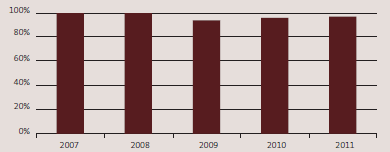 |
| Quality assurance reviews for all appointed auditors are completed during a three-year period. Of the auditors reviewed in any given year, 95% achieve a result of satisfactory or better. The actual result for 2011 was: 100% |
Percentage of auditors achieving a satisfactory or better grade from quality assurance review for the five years from 2007 to 2011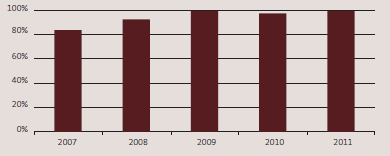 |
| Listening, understanding, and exercising judgment | |
Client survey feedback shows that auditors' knowledge of entities' business and operating context is improving and that auditors are investing in work to understand that context. Our clients give us improved (or at least maintained) ratings compared with the previous two years for their auditors':
|
Audit staff have high levels of expertise This was a new measure in 2010/11. 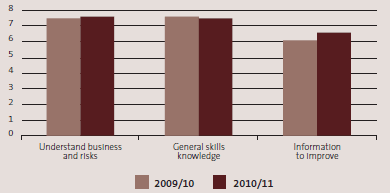 |
| Our quality assurance review of audit and assurance work confirms that auditors are carrying out the requirements of AG-4 (revised). | Audit staff have high levels of expertise: Auditing performance information Our quality assurance reviews of our audit and assurance work confirms that auditors are carrying out their requirements in relation to performance information in keeping with the Auditor-General's Auditing Standards and our attestation that performance statements fairly reflect the achievements of the entity. During 2010/11, a quality assurance review was carried out of a selection of local authority audits (the first sector where AG-4 (revised) applies). The QA review found that auditors understood the new requirements and were suitably trained to audit performance information in accordance with AG-4 (revised). This was a new measure in 2010/11. |
Equal employment opportunities
The Office's programme for addressing equal employment opportunities is through its recruitment and employment policies. The principles of equal opportunity are embedded in the Office's policies and procedures. In particular, our recruitment programme aims to attract and appoint the best people, who have the appropriate skills, values, and attributes to meet the Office's needs, objectives, and strategic direction. We recruit in a manner that provides equal employment opportunity to Māori, women, ethnic or minority groups, and people with disabilities.
Recruitment and employment decisions and practices (such as feedback from exit interviews) are monitored to confirm application of policies. Managers are made aware of, and given support to fulfil, our good employer obligations through specific programmes, courses, and one-on-one coaching.
Our staff profile shows a good level of diversity, which we expect to maintain during the next three years.
Figure 21
Staff profile and diversity
| As at 30 June | 2011 | 2010 |
|---|---|---|
| Staff numbers (full-time equivalents) | ||
| Office of the Auditor-General | 64 | 62 |
| Audit New Zealand | 252 | 251 |
| Corporate Services* | 46 | 41 |
| Total | 362 | 354 |
| Gender distribution – all staff | ||
| Women | 53% | 53% |
| Men | 47% | 47% |
| Gender distribution – executive management | ||
| Women | 50% | 50% |
| Men | 50% | 50% |
| Ethnicity distribution | ||
| NZ European | 49% | 44% |
| NZ Māori | 2% | 2% |
| Pacific Islander | 2% | 3% |
| Asian | 10% | 10% |
| Other European | 12% | 11% |
| Other ethnic groups | 7% | 8% |
| Undeclared | 18% | 22% |
| Functional distribution | ||
| Audit/assurance | 65% | 64% |
| Technical and advisory | 11% | 13% |
| Corporate support | 21% | 20% |
| Senior management | 3% | 3% |
| Turnover | ||
| Office of the Auditor-General | 17% | 8% |
| Audit New Zealand | 15% | 11% |
| Corporate Services* | 30% | 9% |
* Corporate Services function is shared between the OAG and Audit New Zealand.
Business practices
We have an extensive quality assurance programme for all our outputs and services. This programme indicates an acceptable level of quality. Nevertheless, we continue to work on improving this.
In 2010/11, the leadership team continued to focus on those key risks that could affect our reputation, independence, capability, and product integrity, including work on improvements to our stakeholder relationships, information security, and our risk management processes.
Our internal audit function has, in the past, been contracted to an external firm, with an annual internal audit programme agreed with our independent Audit and Risk Committee. We will review this internal audit arrangement for 2011/12 to ensure that it best meets the needs of the Office and the Audit and Risk Committee.
Facilities
In 2010/11, we made progress on addressing our long-term property needs, and have presented a business case for consideration by the Officers of Parliament Committee. We anticipate meeting our objective of co-locating our OAG and Audit New Zealand Wellington staff by 2013.
The Canterbury earthquakes have caused considerable disruption to our Audit New Zealand Christchurch operation, although we are very relieved that none of our people were injured as a result. Our Christchurch staff have been working from temporary premises since February. Although these premises meet our basic requirements, the effectiveness and efficiency of our people has been affected. We are currently seeking suitable long-term premises in the Christchurch area.
Information systems
We rely on information technology to complete our work. To ensure an effective, efficient, and customer-focused service, our audit staff working in the field use specialist auditing and remote access and communications tools. In the OAG, the audit status database system is used to manage the allocation, tracking, and reporting of the 4000 or so audits carried out annually by appointed auditors from Audit New Zealand and about 50 chartered accounting firms. Corporate services staff are responsible for the core financial, time and cost, document and records management, publishing and communications, and human resources systems that underpin the Office's operation.
In 2010/11, we:
- improved the reliability and connectivity of the systems used by our field staff;
- developed the first stage of an off-site "disaster recovery" facility for our central computer systems; and
- enhanced the functionality of our financial management systems and audit tracking systems.

